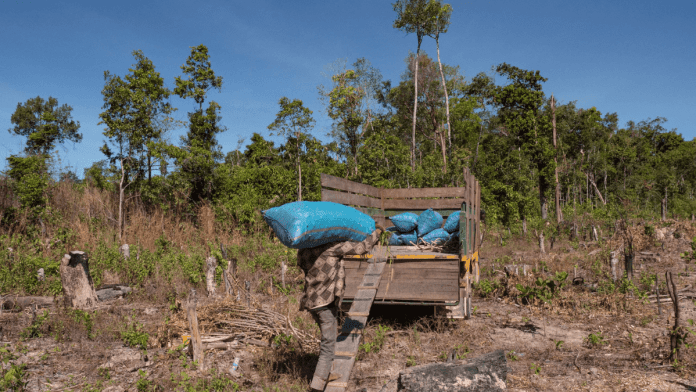News in Brief:
– Microloans, intended to aid farmers, inadvertently contribute to widespread deforestation as borrowers resort to illegal land conversion to meet repayment obligations.
– The alarming trend underscores the urgent need for coordinated action to address the systemic issues driving and safeguard both farmers’ livelihoods and Cambodia’s natural heritage.
A troubling trend has emerged in Cambodia’s Prey Lang Wildlife Sanctuary, as farmers, like husband and wife Piseth and Sokheng, resort to drastic measures to repay microloans. With a loan of just $10,000 from AMK Microfinance Institution, the couple turned to cultivating cassava to meet their monthly repayments, inadvertently contributing to the illegal conversion of protected forests to agricultural land.
Driven by the need to honour microloan commitments, smallholder farmers find themselves trapped in a cycle of debt, resorting to illegal land conversion as a desperate measure. This phenomenon is not isolated; it’s emblematic of a broader issue gripping Cambodia’s agricultural landscape.
For local farmers like Piseth, the allure of microloans to offset crop failures or invest in small farms comes with unforeseen consequences. As they struggle to meet repayment deadlines, the pressure mounts, pushing them towards illegal land conversion. This not only threatens the delicate ecological balance but also jeopardises their own livelihoods.
The consequences are stark: rampant deforestation, loss of biodiversity, and irreparable damage to Cambodia’s natural heritage. A Global Forest Watch data reveals a staggering loss of approximately 8,300 hectares in Prey Lang in 2022 alone, underscoring the urgency of the situation.
While microfinance institutions play a crucial role in providing financial access to underserved communities, their unchecked expansion has inadvertently fueled environmental degradation. Despite pledges to adhere to environmental regulations, evidence suggests a glaring disparity between policy and practice on the ground.
As concerns mount over the pervasive impact of microloan-driven deforestation, stakeholders must come together to address this multifaceted issue. From stringent regulation and oversight of microfinance practices to promoting sustainable agricultural alternatives, concerted efforts are needed to break the cycle of debt and environmental destruction.



